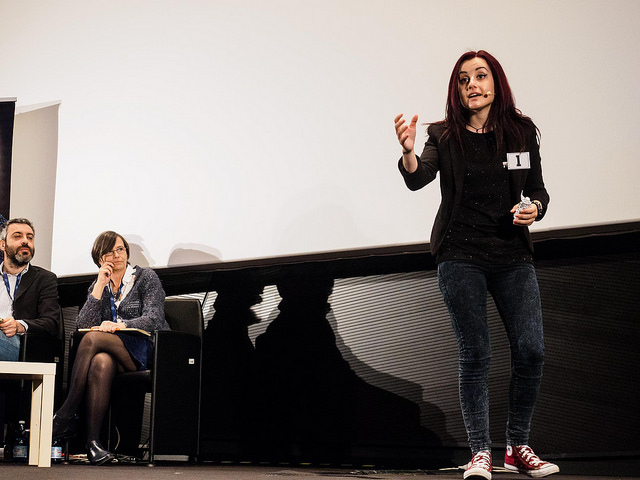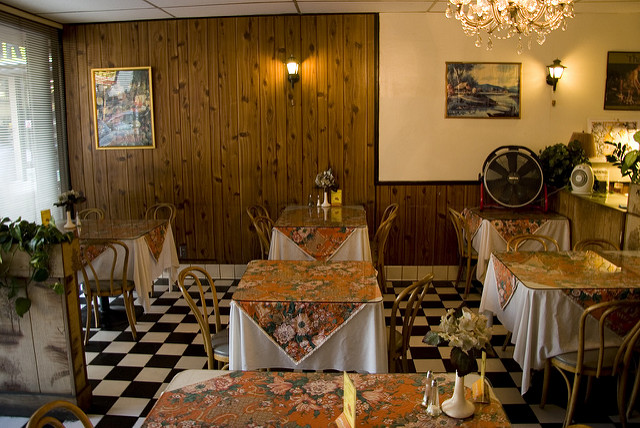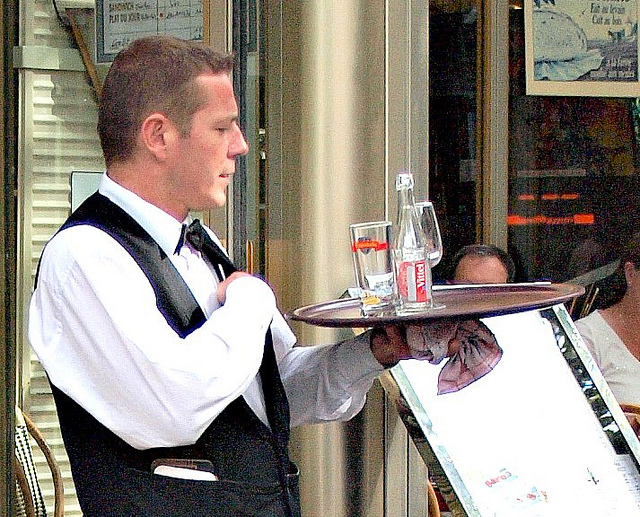Last updated on March 26th, 2017 at 05:35 am
Most people jump at the opportunity of “free.”
At the end of our serving shift, I told the other server our tips were a dollar over, and I wanted her to have it. She tried shrugging it off. She continued pushing the vacuum cleaner over the tan carpet. “Don’t worry about it,” she said.
I insisted. I told her I left it in my pocket and almost forgot it. If she didn’t take it, the guilt would eat me.
She thought about it for a millisecond. “Okay. I’ll take it. I’m poor,” she said with a short laugh, then, just as quickly, “just kidding,” as she shoved the money into her hip pocket.
For Karen, the Lobster Meat Summer Roll was love at first sight – filled with delicately cooked lobster meat, fresh spring mix, mangoes and strawberries. The sushi chefs wrapped them in rice paper, then drizzled a tangy Thai citrus sauce on top, and perched it upright in a tantalizing balancing act. “Oh, that looks good,” Karen said.
So good, in fact, that when she saw Tracy carry an unfinished piece back into the kitchen, her eyes grew to size of saucers, lustful, in hope and anticipation. “Oh,” she said softly. She quickly followed Tracy in. She asked, “Are they going to take that home?”
“Uh, no,” Tracy said.
“Good,” and with one swift bite, it was gone.
Wei-Yi breathed in figures and numbers, and spat out the results in different languages. She couldn’t pick up how to be a good server, however. She didn’t last long. Yet she forced the restaurant to limit the post-shift meal (and its 50 percent discount) to one item.
“How come you’re ordering so much?” Alan asked, watching her ring in her and her boyfriend’s dinner, as well as her lunch for tomorrow, into the computer.
“Well, it’s 50 percent off. Why wouldn’t I order a lot?” she said.
Kathleen, who eventually replaced Wei-Yi, had a similar mentality. She shared the same cluelessness about restaurant work, too (though she remained blissfully free of the intelligence.) Once, she forgot to remind our Head Chef to keep mushrooms out of the Sautéed Noodles. The dish came out incorrectly, and that the fault lied even remotely upon her never crossed her mind. The notion she should offer to pay for the wasted dish – beyond her grasp.
Instead, she volunteered to eat it.
“Oh, I was hoping you’d ask!” she replied when the owner asked her if she wanted it. “I love noodles!”
And you’ll find the sushi chef, Alan, constantly rummaging through the fridge, a stray Greyhound looking for its next free meal. The wiry 26-year-old – who’s first in-line for breakfast, lunch, and dinner – knows how to put the food away. Just as long as he doesn’t have to buy it.
Before the staff dinner, he came into the kitchen, and picked out a yellow banana – ones used for tempura dessert. “It looks like it’s going bad,” he said.
Frank sat atop an empty soy sauce container. He didn’t even look up from his newspaper. “So just eat it,” he’d replied, but Alan’s didn’t hear, already half-way through the banana.
The word “free” in “The Free World” has taken on a new meaning. “Free” has infected our consciousness, and today we’re a culture scrambling for handouts: checking Craigslist for rummage “sales,” or visiting BJ’s for free samples. Fans at a sports event will dive over three seat rows to get an extra-large t-shirt they’ll never wear, shot from an absurd cannon-contraption, simply because, besides their dignity, there’s nothing to lose.
Free downloads.
Free money.
Low shirt, short dress, and a seductive glance equals free drinks.
Free morsels on toothpicks – little pieces of Bourbon chicken you take not because you’re hungry but because they’re waving it in your face and jeez, it’d just be rude to refuse.
No sex! – but here are your free condoms, just in case.
Free HIV tests.
Free month supply of Extenz – “you just pay for the stamp!”
Free magnets, pens, pencils. Free meals, free lunch, free time.
Free Willy. Free mugs. Free ringtones, wallpapers, and Proactive Refining Mask solutions.
In this world dominated by “free,” it’s rare to find someone like Martin, who looks down upon the notion of handouts or charity. It’s rare to find someone who refuses “free.” On one slow Saturday evening, Frank planned on leaving work early to have dinner at a new restaurant down the street.
“Would you like to come?” he asked Martin.
“Uh, no,” Martin replied with a snicker.
Frank ignored it, as he did whenever he already made up his mind. Ten minutes later, Martin changed out of his uniform, and they put on their coats. “Can we do separate checks?” Martin asked, as they stepped out of the doors.
Before he left for the city one weekend, he ordered two Jack and Cokes for himself, and a martini for his friend. I told him it was on the house. He left a $20 bill on the bar anyway, went outside, and waited in the car that was warming up in the parking lot.
I followed him out, and threw the bill through the window, into his lap.
Two minutes later, he came back in and slapped it on the black stone counter. He gave me a serious look. “Ming, don’t ever take anything for free,” he warned. He didn’t elaborate. Martin rarely did. That was his style: put out a nugget of wisdom, and see who picked up on it.
Then he was gone.
It was this attitude, this nose-in-the-air defiance to the Free Movement, that earned him the respect of others. It’s why I respected him. Because a person who never takes is a person who does not need.
And a person who doesn’t need – wouldn’t you call that being “free?”
Martin wasn’t – isn’t, perfect. Far from it. He is still guilty of his own childish behaviors, susceptible to the whims and fancies of a 7-year-old child. Yesterday he tells you he’s getting married and moving to Indonesia. Tomorrow he’s living in Kentucky, working for another restaurant. Anytime someone tried to give him money, he made an unnecessary production of the affair, so that people had no choice but to recognize his principles. Kayleigh once tried giving him $5, for the coffees he bought her, but he refused the money. They argued for a few minutes, until Martin finally took the $5 bill, and threw it into the trash. Then he walked upstairs, with Kayleigh shouting at his back, “I’m not taking it back! It’s staying in the garbage can!”
“Fine,” Martin said.
Minutes later, Big Chef came running up the stairs, holding the $5 bill. “Money, money, money! Honey, your money!” Kayleigh laughed, and half-exasperated, half-relieved she didn’t just throw out good money, said, “Yes, Honey, my money.” She took the bill and put it into her apron. Martin smirked from the corner of the bar.
Someone once referred to him as a martyr, which is more accurate than not. I prefer thinking of him as a person with honor, though. A person with pride. He is someone who takes nothing for granted, here, in the Land of the Free. He knows there are notions and values that no one can just give away, with, say, two proofs of purchase and the cost of shipping and handling.
No. There are still some things you simply must earn.
Photo Credit: Gwen Wright









